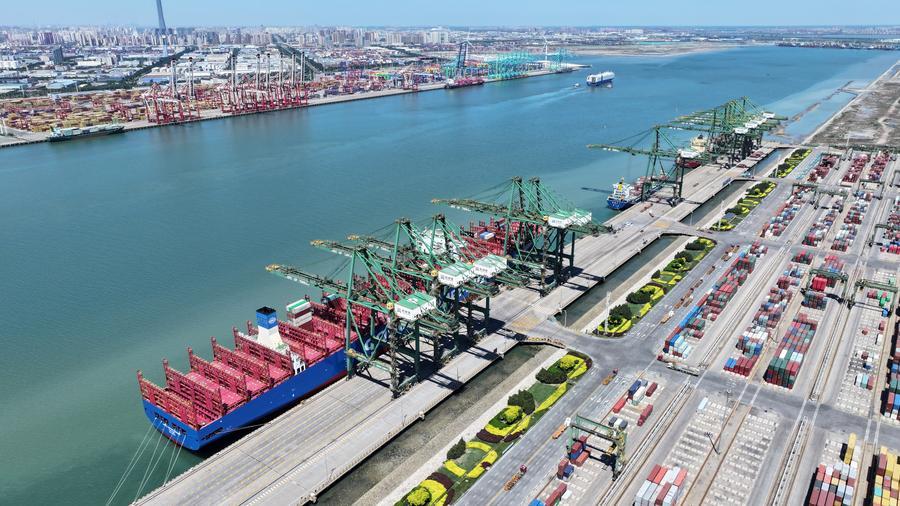An aerial drone photo taken on May 15, 2024 shows the container ship COSCO Shipping Camellia at the Pacific International Container Terminal of Tianjin
Representatives from global shipping industry have expressed the hope that the sector will seek more robust and sustainable growth models under new circumstances.
At the ongoing Tianjin International Shipping Industry Expo 2024, representatives of about 400 shipping companies, ports and industry associations from the world discussed development trends, paths and opportunities of the shipping industry.
Maritime shipping is crucial to the world economy as 85 percent of all global trade is seaborne, and China plays an important role in this, according to Steve Gordon, global head of Clarkson Research Services Ltd., a shipping research institution.
"In many areas of the maritime economy, China is incredibly important and has secured market leading positions globally," said Gordon.
China has become the world's largest trader of goods. According to the General Administration of Customs, in the first five months of this year, China's foreign trade in goods stood at 17.5 trillion yuan (about 2.4 trillion U.S. dollars), up by 6.3 percent year on year, said Wang Shouwen, vice minister of commerce.
Zhen Hong, director of the Shanghai International Shipping Institute Academic Committee, believes that the development of a port-based economy is an inevitable requirement for the development of new quality productive forces in ports.
Ports need to break away from the development model that simply pursues port throughput and transform into a model where the port drives the high-quality development of a port-based economy, Zhen said.
This will help make a port more efficient, resilient, and convenient in terms of service, to better serve the high-quality development of the economy, Zhen explained.
In recent years, the global shipping industry has encountered unprecedented challenges. The COVID-19 pandemic tested the fabric of the global supply chain, causing widespread disruptions but also showcasing its incredible resilience.
"Red Sea threats and disruptions in the Panama Canal have added complexity to our operations, yet these events have also driven us to develop more robust and flexible solutions," said Joseph Edward Kramek, president and CEO designate of the World Shipping Council.
Kramek added that, despite these challenges, the ocean supply chain has held fast.
"The fight against climate change is paramount, and our industry must lead the charge towards zero-emission fuels. This challenge also presents a significant opportunity for innovation in green technology, opening new markets and creating sustainable growth," Kramek said.





